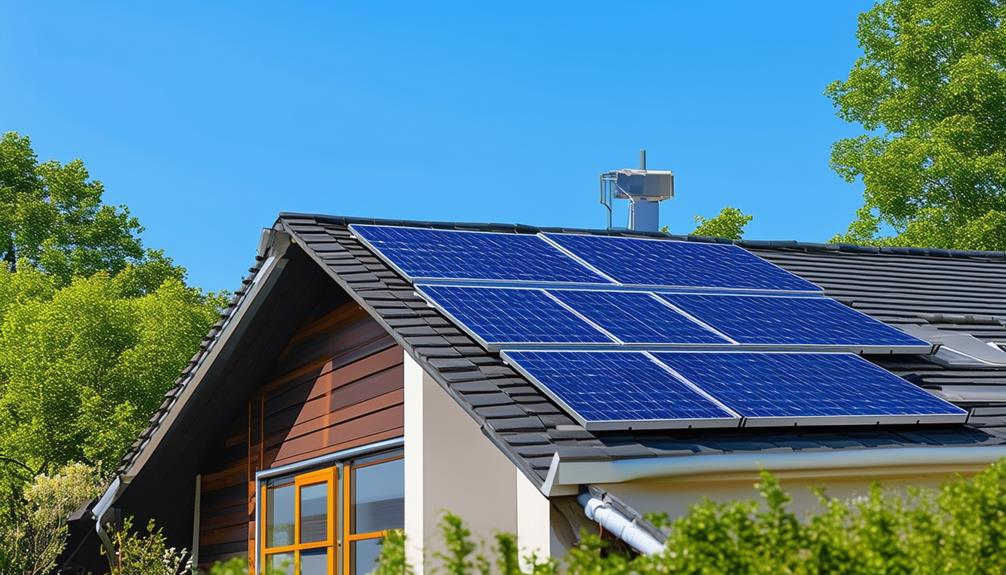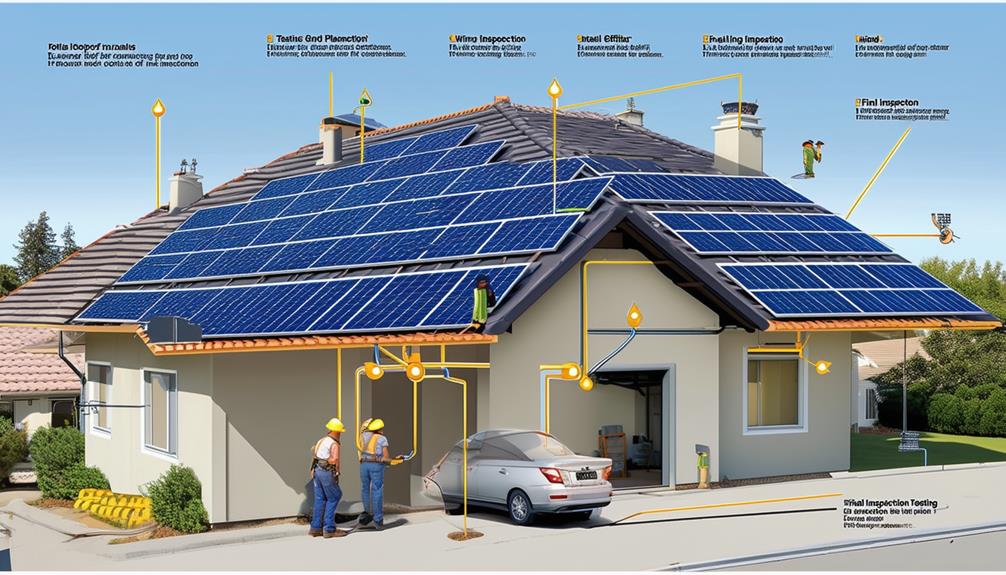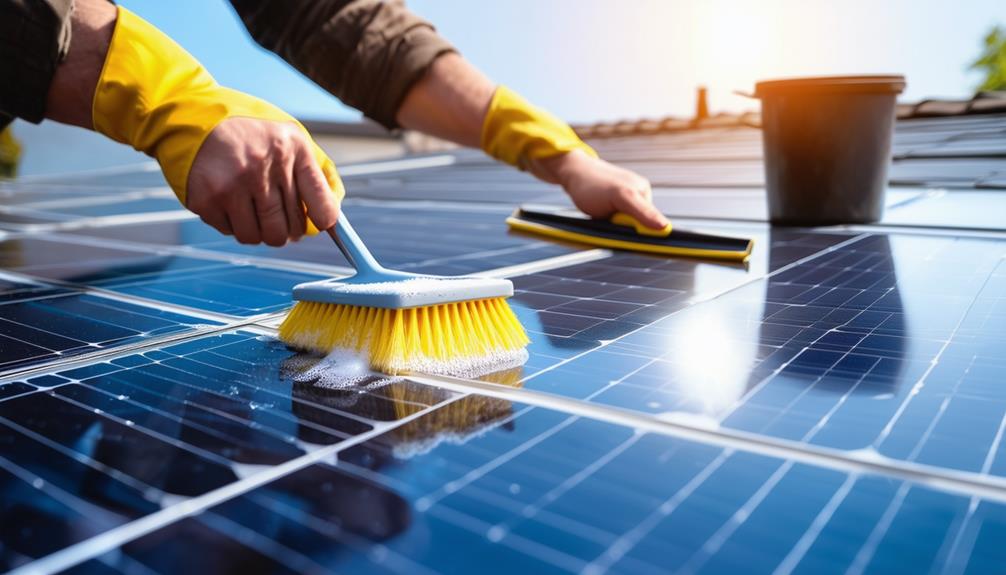Maximize the power of solar roofing for enhanced environmental impact, reduced emissions, and decreased reliance on fossil fuels. Witness a drop in electricity bills over time and take advantage of solar rebates for financial benefits. Follow installation steps like site assessment and meticulous planning for a seamless setup. Embrace home sustainability through renewable energy, green technology, and lower carbon footprint. For peak performance and longevity, stick to maintenance tips such as regular cleaning, inspections, and professional upkeep. Discover more about the sustainable journey and financial advantages that solar roofing brings.
Advantages of Solar Roofing

Installing solar roofing offers numerous benefits, ranging from reducing energy costs to increasing sustainability. One significant advantage of solar roofing is its positive environmental impact. By harnessing the power of the sun to generate electricity, solar panels help reduce greenhouse gas emissions, combat climate change, and decrease reliance on fossil fuels. This environmentally friendly solution contributes to a healthier planet for current and future generations.
In addition to its environmental benefits, solar roofing also provides long-term savings for homeowners. While the initial investment in solar panels and installation may seem substantial, the long-term cost savings are significant. By generating your electricity from the sun, you can reduce or even eliminate your monthly electricity bills. Over time, these savings add up, allowing you to recoup your initial investment and potentially even earn money through net metering programs. Embracing solar roofing not only benefits the environment but also your wallet in the long run.
Cost-Effective Energy Solution
Harnessing solar energy through a rooftop system is a key solution for meeting your energy needs while reducing long-term expenses. Solar roofing provides a sustainable energy source that can greatly lower your electricity bills over time. One key aspect that enhances the cost-effectiveness of solar roofing is the availability of solar rebates. These rebates, offered by governments or utility companies, can help offset the initial installation costs of a solar roof, making it a more financially attractive option for homeowners.
In addition to the direct financial benefits, solar roofing also has a positive environmental impact. By generating clean electricity from the sun's rays, you can reduce your carbon footprint and contribute to a greener future. This environmental aspect is important in today's world, where sustainability and eco-friendliness are becoming increasingly essential factors in decision-making processes.
Steps for Installing Solar Roofing

To guarantee a successful installation of solar roofing, meticulous planning and precise measurements are essential for maximizing efficiency and effectiveness. Proper installation techniques make sure that your solar panels function at their best and provide the greatest return on investment. Here are some steps to guide you through the installation process:
- Site Assessment: Conduct a thorough evaluation of your roof to determine its suitability for solar panel installation.
- Structural Integrity Check: Ensure that your roof can support the additional weight of the solar panels and make any necessary reinforcements.
- Electrical Setup: Plan the electrical wiring and connections to seamlessly integrate the solar panels into your home's electrical system.
- Safety Precautions: Prioritize safety by using proper equipment, following industry guidelines, and considering factors like roof slope and weather conditions during installation.
Enhancing Home Sustainability
Achieving greater sustainability in your home involves implementing strategic changes that reduce environmental impact and increase energy efficiency. One effective way to enhance home sustainability is by incorporating green technology, such as solar roofing. Solar roofing systems utilize renewable energy from the sun to generate electricity, reducing the reliance on traditional fossil fuels. By harnessing solar power, you can notably decrease your carbon footprint and contribute to a greener environment.
The installation of solar roofing not only benefits the environment but also offers financial advantages in the long run. By generating your own electricity, you can reduce monthly energy bills and potentially even earn credits through net metering programs. This not only saves you money but also encourages energy conservation and efficiency. Additionally, solar panels have a long lifespan and require minimal maintenance, further reducing their environmental impact compared to traditional energy sources. Embracing green technology like solar roofing is a practical and sustainable way to make your home more environmentally friendly.
Maintenance Tips for Solar Panels

Implementing regular maintenance practices is crucial for guaranteeing the best performance and longevity of your solar panels. To keep your solar panels functioning efficiently, consider the following maintenance tips:
- Cleaning Techniques:
- Regularly clean the surface of the panels with a soft cloth or sponge and mild soapy water to remove dirt, dust, and debris that may obstruct sunlight absorption.
- Avoid using abrasive materials or harsh chemicals that could damage the panels' protective coating.
- Inspection Routine:
- Conduct visual inspections of your solar panels to check for any signs of physical damage, such as cracks or corrosion, and promptly address any issues.
- Repair Options:
- In case of minor damages, such as loose wiring or small cracks, contact a professional solar panel technician to perform repairs and ensure peak functionality.
- Professional Maintenance:
- Consider scheduling regular professional maintenance services to assess the overall condition of your solar panels and address any potential issues before they escalate.
Frequently Asked Questions
Can Solar Roofing Be Installed on All Types of Roofs?
Yes, solar roofing can be installed on most types of roofs. Different materials may require specific mounting methods, but with proper planning and expertise, installation challenges can be overcome. Factors like roof orientation, shading, and structural integrity play a role in determining the feasibility of solar roofing. Consulting with professionals can help assess your roof's suitability for solar installation and address any potential obstacles.
Is It Possible to Store Excess Energy Generated by Solar Roofing?
Yes, it is possible to store excess energy generated by solar roofing. Energy storage solutions like batteries allow you to save surplus energy for later use. This stored energy can be integrated into the grid when needed, providing a reliable power source. Grid integration guarantees a continuous electricity supply, making your solar roofing system even more efficient and sustainable. Energy storage technologies play a vital role in maximizing the benefits of solar energy.
Do Solar Panels Require Special Insurance Coverage?
When considering solar panels, it's important to understand insurance coverage requirements. Most standard homeowner policies cover solar panels, but you may need to adjust coverage limits. Some insurers offer specialized policies for solar installations, which could impact costs. Consider factors like panel quality, installation method, and location when evaluating insurance needs. Discuss with your insurer to guarantee adequate coverage for potential damages or system malfunctions. Reviewing insurance options thoroughly can help avoid costly surprises.
Are There Government Incentives Available for Installing Solar Roofing?
Government incentives for solar roofing include financial savings through tax credits. These incentives promote environmental impact and energy independence by encouraging the adoption of renewable energy sources. By taking advantage of these programs, you can not only reduce your carbon footprint but also benefit from cost savings and increased self-sufficiency in energy production. Be sure to explore the available incentives in your area to maximize the advantages of installing solar roofing.
Can Solar Roofing Be Integrated With Existing Home Automation Systems?
When integrating solar roofing with existing home automation systems, you may encounter integration challenges due to compatibility issues. Some older automation systems may not communicate effectively with the newer solar technology. Ensuring compatibility through proper communication protocols and system updates is essential for seamless integration. Consider consulting with a professional to assess your current setup and determine the best approach to incorporate solar roofing into your home automation system.
Conclusion
Overall, solar roofing offers numerous benefits for homeowners, providing a cost-effective energy solution that enhances home sustainability. In fact, studies have shown that installing solar panels can reduce electricity bills by up to 70%. By following the steps outlined for installation and proper maintenance, you can maximize the efficiency of your solar roofing system and enjoy the long-term savings and environmental benefits it provides.




